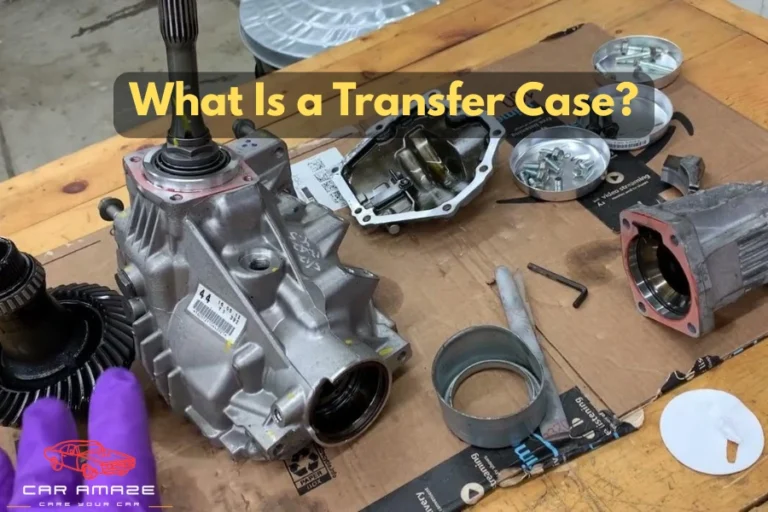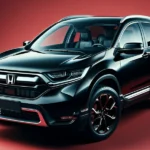Fuel Economy of Smart Car | MPG of Smart Cars, Facts, & Tips
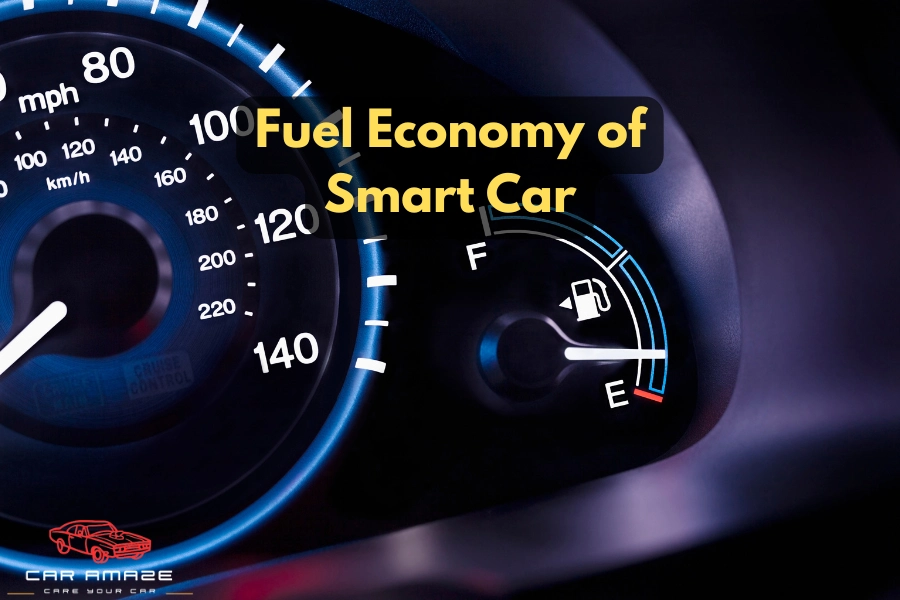
When people plan to buy a smart car, the first thing that comes to their mind is the fuel economy of the smart car. Many believe that such a small car must get amazing gas mileage. But is that really true? In this guide, I will tell you everything about smart car MPG, tips to improve mileage, average mileage of real-world smart cars, and more, based on my experience and research.
Table of contents
- What Does Fuel Economy on a Smart Car Mean?
- Fuel Economy of Smart Car – Full Guide
- Why the Fuel Economy of a Smart Car May Vary and How to Improve It
- Average Mileage of Real-World Smart Cars
- Conclusion
- FAQs
What Does Fuel Economy on a Smart Car Mean?
Before we start discussing the info about miles per gallon on a Smart car, let’s understand what fuel economy is. The fuel economy tells us how far a car can travel using a certain amount of fuel. We usually measure fuel economy on a smart car in miles per gallon (MPG). For example, if a car gets 30 MPG, it means it can travel 30 miles with one gallon of gas. Now I will discuss how much fuel economy smart cars have, how they work, and the mileage per gallon of popular smart cars.
Fuel Economy of Smart Car – MPG Values, Practical MPG Calculation, and More
The average fuel economy of a Smart car is between 33 MPG and 39 MPG. This is good average mileage, but not as high as many people expect mileage for a Smart car. Smart car MPG values also vary based on the driving style and driving area. Here is a breakdown of different driving areas:
- City driving: The smart car’s MPG is about 32–36 MPG.
- Highway driving: The smart car’s MPG is about 38–41.
- Combined average: The smart car’s MPG is around 35–39 MPG.
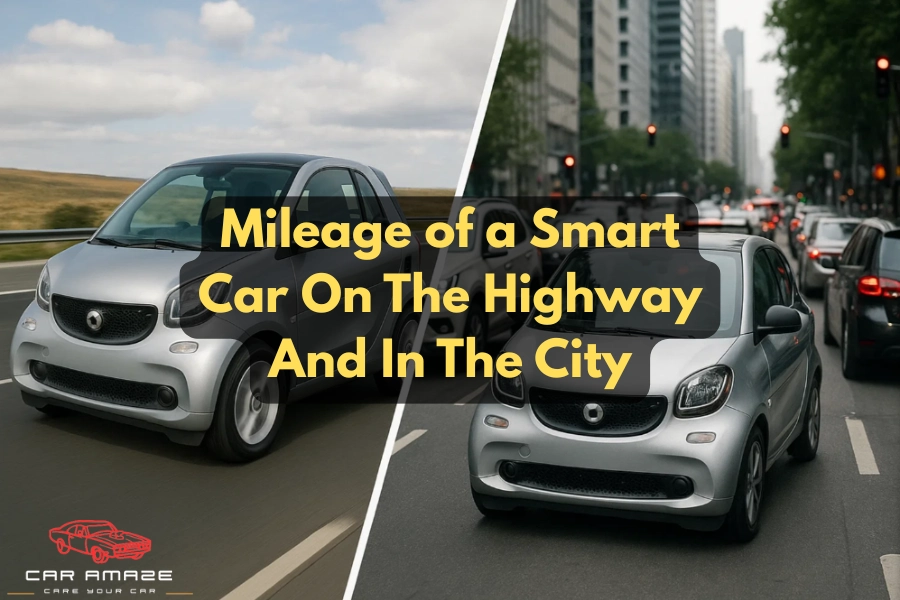
In short, you can say that smart cars offer better mileage than other larger cars. The mileage may also vary based on fuel, engine, and model. Let’s dive deeper.
Fuel Economy of Gasoline vs. Electric Smart Cars
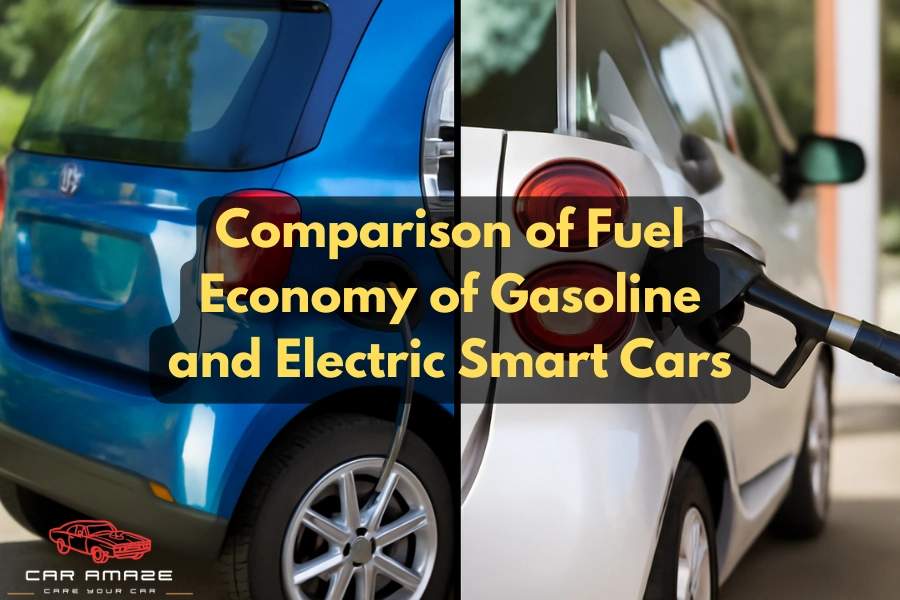
The smart car usually comes in two categories, which are gasoline models and electric models. We can measure the mileage of a gasoline smart car, but for an electric smart car, we can measure the electric energy efficiency. The details about the fuel economy of a Smart car with a gasoline engine are listed below:
- Typical mileage of a Smart Car is around 33–39 MPG combined.
- On average, the tank size is around 8.7 gallons, including a 1.3-gallon reserve.
- So, you can drive almost 330–390 miles on a full tank.
In comparison, the electric smart car uses electric charge to run. We can compare their energy efficiency using MPGe (miles per gallon equivalent). MPGe is a unit of measurement used by the EPA that shows how much an electric car can travel on the energy equivalent of one gallon of gasoline. Here are some examples:
- The Smart EQ Coupe has a rating of up to 108 MPGe combined (city and highway driving).
- The Smart EQ Cabrio has a rating of about 102 MPGe combined.
- On average, you can get a 58–100-mile range per charge, depending on the model and battery.
If you want maximum efficiency, the electric Smart Car gives the best mileage for a Smart Car.
Fuel Economy of a Smart Car Compared to Other Cars
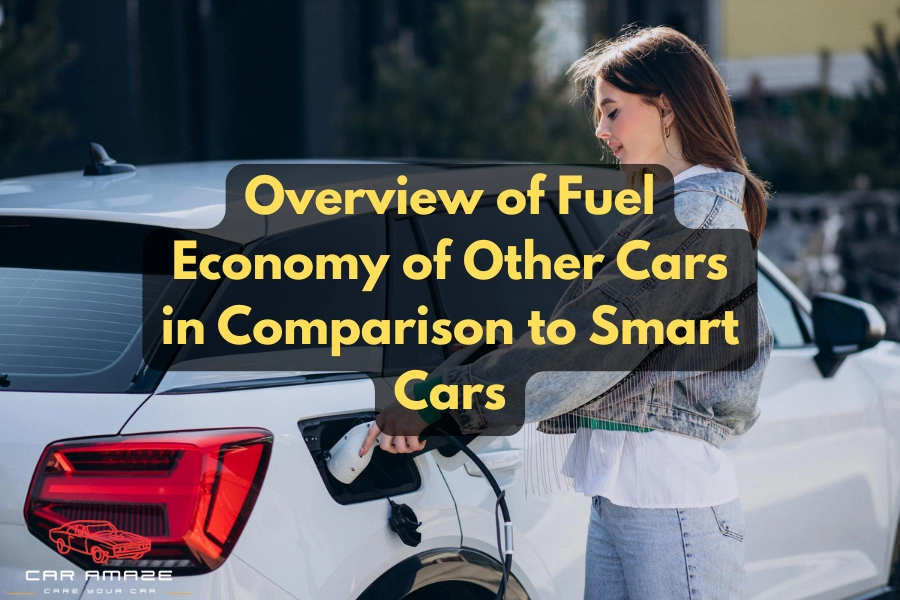
You might be concerned about how different the mileage of a smart car is as compared to other cars. Is the mileage of a Smart Car really better than other cars? Here is the precise comparison:
- Smart Car (gas) mileage is 33–39 MPG.
- Toyota Prius (hybrid) mileage is 50–56 MPG.
- Honda Civic (gas) mileage is 30–36 MPG.
- Mini Cooper mileage is 29–38 MPG.
- Smart EQ (electric) is 100+ MPGe.
So, you can conclude that the average fuel economy of a smart car is better than other gas cars, excluding hybrid cars. However, its tiny size, easy parking, and low running costs still make it a smart choice for city driving.
Fuel Economy of a Smart Car Using Gas and Premium
An important detail that many people miss is that the fuel economy of a car stays much better on premium gasoline than normal gas. Premium gasoline has many benefits, such as burning cleaner, preventing engine knocking, and helping maintain fuel economy. One downside is that it costs more than regular gas, but it is not an issue because you will get better mileage for a smart car.
How to Calculate the Fuel Economy of a Smart Car
The average mileage of a smart car that I mentioned above is a general estimation. If you want 100% accurate fuel economy for your smart car, here is the procedure:
- Fill your tank completely.
- Reset your trip odometer.
- Drive as usual.
- Refill the tank and note how many gallons you used.
- The formula for MPG is miles driven divided by fuel gallons used.
- For example:
- Miles driven: 300
- Gallons used: 9
- MPG = 300 ÷ 9 = 33 MPG
This gives you the exact value of miles per gallon on a smart car based on your driving style. So, with these average mileage limits estimations and practical methods to calculate fuel economy, you can get an accurate idea of your smart car’s MPG.
Why the Fuel Economy of a Smart Car May Vary and How to Improve It
As we discussed, the fuel economy of a smart car falls in the range of 33 to 39 MPG. But do you know that real-life results may vary based on driving style, car condition, and road conditions? Many drivers reported an average of 27 miles per gallon on smart cars, and some even reported up to 45 MPG. Here are some main factors that affect the mileage of a smart car:
- Driving style: Fast starts, speeding, and sport mode use more fuel.
- Road type: Stop-and-go city traffic lowers MPG, while smooth highways increase it.
- Terrain: Hilly areas use more fuel than flat roads.
- Weather: Cold weather can lower gas mileage.
- Maintenance: Dirty air filters, under-inflated tires, and old oil reduce efficiency.
- Fuel type: Smart Cars need premium gas (91 octane), which burns cleaner but costs more.
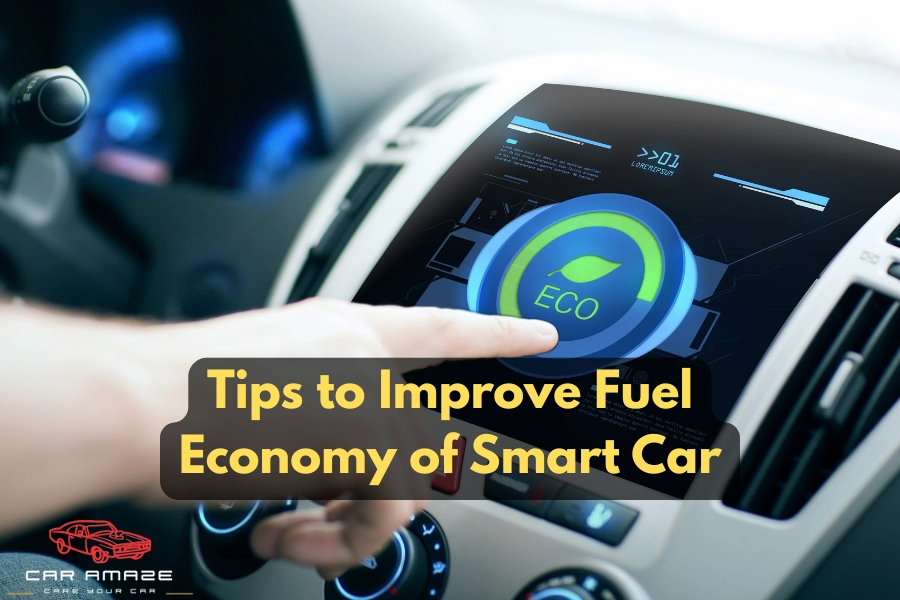
Despite all these factors, with some good habits, you can improve the Smart Car MPG. Here are some of my recommendations:
- Drive smoothly and avoid hard braking and fast acceleration.
- Keep tires inflated because low tire pressure wastes fuel.
- Use eco mode if your car has it.
- Remove extra weight from the trunk.
- Get regular oil changes.
- Replace dirty air filters.
- Avoid long idling (don’t keep the engine running while parked).
- Use quality fuel from trusted gas stations.
- These small steps can make a big difference in your Smart Car MPG.
Average Mileage of Real-World Smart Cars
Now I am sharing the average mileage reports of some smart cars that came between the years 2017 and 2023. Here are some smart car MPG values of some smart cars:
- 2017 Smart Fortwo Passion 0.9L L3 GAS Automatic Dual Clutch 6 Speed: MPG (combined city/highway) is 36.0.
- 2017 Smart Fortwo Prime 0.9L L3 GAS Automatic Dual Clutch 6 Speed: MPG (combined city/highway) reported by different users are 36.3, 28.2, 29.8, 31.5, 34.2, 32.7, and 30.7.
- 2017 Smart Fortwo Prime 0.9L L3 GAS Automatic Dual Clutch 6-Speed Coupe: MPG (combined city/highway) is 36.5.
- 2017 Smart Fortwo Turbo 0.9L L3 GAS Automatic Dual Clutch 6-Speed Convertible: MPG (combined city/highway) is 40.4.
- 2017 Smart Fortwo Prime 0.9L L3 GAS Automatic Dual Clutch 6-Speed Coupe: MPG (combined city/highway) is 43.6.
- 2017 Smart Fortwo Passion 0.9L L3 GAS Automatic Dual Clutch 6-Speed Coupe: MPG (combined city/highway) is 42.3.
- 2017 Smart Fortwo Passion 0.9L L3 GAS Standard 5 Speed: MPG (combined city/highway) is 29.5.
- 2017 smart fortwo electric drive convertible Automatic (A1): 102 combined (city/highway) MPGe.
- 2017 smart fortwo electric drive coupe Automatic (A1): 108 combined (city/highway) MPGe.
- 2018 Smart Fortwo Brabus 0.9L L3 GAS Automatic Dual Clutch 6 Speed: MPG (combined city/highway) is 38.9.
- 2018 Smart Fortwo Prime 0.9L L3 GAS Automatic Dual Clutch 6 Speed: MPG (combined city/highway) reported by different users are 31.4 and 36.3.
- 2018 Smart Fortwo Passion 1.0L L3 GAS Automatic Dual Clutch 6 Speed: MPG (combined city/highway) reported by different users are 31.6 and 25.2.
- 2018 Smart Fortwo Prime: MPG (combined city/highway) reported by different users is 34.4.
- 2019 smart EQ fortwo (coupe) Automatic (A1), Electricity: 108 combined (city/highway) MPGe.
- 2019 smart EQ fortwo (convertible) Automatic (A1), Electricity: 102 combined (city/highway) MPGe.
- 2020 Smart EQ fortwo: 149 combined (city/highway) MPGe.
- 2020 Smart EQ forfour: 143 combined (city/highway) MPGe.
- 2020 Smart EQ fortwo Cabrio: 136 combined (city/highway) MPGe.
- 2023 Smart #1: 141 combined (city/highway) MPGe.
- 2023 Smart #1 BRABUS: 141 combined (city/highway) MPGe.
Conclusion
In short, the good fuel economy of the Smart car is one of the main reasons behind its popularity. On average, you can get around 33-39 miles on a smart car with a gas engine and around 110 MPGe for electric smart car models. If you maintain it well, use premium gas, and drive smartly, you can get even better mileage.Now you can confidently make your decision about choosing a smart car if MPG is your main concern. It is a smart choice for fuel-conscious drivers. If you want to make your smart car look more beautiful with wrapping, do not forget to check out my top smart car wrap ideas on Car Amaze.
FAQs
Do Smart Cars have good gas mileage?
Yes, the Smart Car’s gas mileage is very good, which is about 33–39 MPG. That is better than many regular cars, but not as good as hybrids.
What is the range of a Smart Car?
A gas-powered Smart Car can go about 350–400 miles per tank. An electric Smart Car can go 58–100 miles per charge.
Is Smart Car MPG better in the city or on the highway?
Highway driving usually gives better MPG. In the city, frequent stops lower the mileage on a Smart Car.
Can I use regular gas in a Smart Car?
No. Smart Cars need premium 91 octane fuel for best performance and efficiency.
How does Smart Car MPG compare to hybrids?
Some hybrids, like the Prius, get 50+ MPG, which is higher than the mileage of a Smart Car. But Smart Cars are cheaper and smaller, perfect for city driving.

